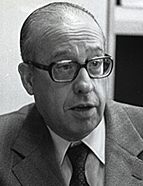

Magalhães Godinho was the son of Vitorino Henriques Godinho and Maria José Vilhena Barbosa de Magalhães. His father, an army officer with the Army Staff course, was Chief of Staff of the Portuguese Expeditionary Force in Flanders in the First World War (1914-1918); he was a military attaché to the Embassy of Portugal in Paris and taught at the Escola de Guerra e dos Altos Estudos Militares [Higher Military Studies School]. He joined the ‘young Turks’, a group of army officers who sought to transform the newly proclaimed (5 October 1910) Portuguese Republic into a new, progressive regime; he was a member of parliament, Ministro dos Negócios Estrangeiros e do Interior, [Ministry of Foreign Affairs and of the Home Office] and, Director-general (and reorganiser) of Statistics. His promotion to general was barred by dictatorship officials (1926) and he became an officer in the Army Reserves with the rank of Colonel. On his mother’s side, Magalhães Godinho came from illustrious families from the Aveiro region, as he was the nephew of army officer Manuel de Almeida Magalhães, a republican who supported the new regime from its first incursion in 1911, fought in World War 1 both in Africa and in France, was arrested as one of Sidónio’s supporters and who played a major role in the fight against the monarchy in the North of the country; he was also governor of the Cape Verde and Macao colonies; another of Godinho’s uncles, José Maria Vilhena Barbosa de Magalhães, was a renowned lawyer (President of the Portuguese Bar Association in 1933), a professor at the Faculdade de Direito de Lisboa [the Lisbon Law School], a member of parliament and Minister for Justice, Public Education and Foreign Affairs. A staunch and active democrat, he joined Afonso Costa’s Portuguese Republican Party. He was eventually forced to resign from his position as full professor.
Magalhães Godinho’s background, personality and fortune are partially ignored, his roots often unknown. “Our craft, particularly where it identifies with our life, often stems from remote roots. I can’t recall now whether my taste for history was awakened by my intermittent reading of the bulky but never dull História de Portugal [History of Portugal] by Pinheiro Chagas […], assisted by the civic booklets of Victor Ribeiro, or […] reading Guizot’s limpid History of Civilization in Europe […].” A stimulating history of Portugal, a history of European civilization where learning and an attempted global view go hand in hand.
